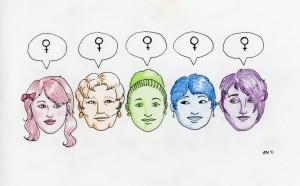Putting Gender in the Vagina
 A feminist movement that uses theatre as its vessel for discussion is an exciting, fresh way to introduce people on the 5Cs, regardless of gender, to the importance of being comfortable in one’s own body. The V-Day Claremont Club’s production of The Vagina Monologues by Eve Ensler that will be performed this April strives to be this movement. The Vagina Monologues is a compilation of monologues that uniquely and diversely explore what it means to embrace womanhood. They strive to express the sufferings, accomplishments, fears, discoveries and celebrations of love that women experience. The V-Day Claremont club on the 5Cs has been hosting a performance of TVM for several years and this year, co-directors Angie Moore (PZ ’13) and Devin Grenley (SCR’13) and co-producers Holly Underhill (SCR ’13) and Sara Berge (SCR ’13) are celebrating and challenging what it means to be a woman.
A feminist movement that uses theatre as its vessel for discussion is an exciting, fresh way to introduce people on the 5Cs, regardless of gender, to the importance of being comfortable in one’s own body. The V-Day Claremont Club’s production of The Vagina Monologues by Eve Ensler that will be performed this April strives to be this movement. The Vagina Monologues is a compilation of monologues that uniquely and diversely explore what it means to embrace womanhood. They strive to express the sufferings, accomplishments, fears, discoveries and celebrations of love that women experience. The V-Day Claremont club on the 5Cs has been hosting a performance of TVM for several years and this year, co-directors Angie Moore (PZ ’13) and Devin Grenley (SCR’13) and co-producers Holly Underhill (SCR ’13) and Sara Berge (SCR ’13) are celebrating and challenging what it means to be a woman.
This production is first and foremost an opportunity to explore femininity and gender. “[T]his is about activism, not acting,” as Sara Berge said. “We want to reach the masses, really impact the 5C community.”
The producers first want to reach out to their cast and make the production experience memorable through empowerment. “It’s not just a show, it’s a movement,” said Angie Moore. The goal is to become “more empowered human beings in this process and realize the power of our own voice.” For this production, gender identity is the lens through which the cast and crew will explore this power.
“The history of TVM and feminism is a white, straight history,” Moore said. “Eve Ensler has outlets for breaking from that but it feels more tokenizing [towards women of color, queer women].” As a result, the show limits not only its topics, but its potential to be a wonderful opportunity for discussing feminist issues and empowering all women to be proud of their identity. This spring’s production of TVM aims to break from the traditional production of TVM that tokenizes and generalizes the image of “woman” by including a monologue for transwomen that intimately and poignantly reveals the pain and oppression transwomen face from a society that does not necessarily understand what it means to have a gender identity that is different from one’s biological sex.
Including the transwoman’s monologue is a unique decision – one that I am particularly thrilled about. The concept of gender as an identity separate from sex is something that is complex and potentially frightening because it forces people to confront what it means to be a woman or a man not just in society, but for the individual. Through the oppression that transwomen have faced, we too are made to ask, “Why are we afraid of gender?” We are made to see gender as a form of identity that we can change by ourselves, and that powerful self-awareness and acceptance is beautiful.
Throughout the production, directors and producers are faced with the challenge of making gender visible; during auditions, actors were asked to give their preferred gender pronoun (“he”, “she”, “ze”, “they”, etc.). During the first meeting with the full cast and crew, everyone participated in discussions that raised questions about personal identity and gender identity. With questions such as, “When did you first think about your gender identity?” and “Describe a time when you felt disempowered or voiceless,” the producers and directors have helped the cast to think about what it means to be a woman and to use that individual identity to create a stronger, more confident woman on the stage and off. This identity of “woman” may not be the same for all cast members, but it is important, as Berge said, “to meet people where they are” and to nurture each identity so that it may grow in a way that makes each woman feel strong and proud of herself. As a result, the cast will build a cohesive group through its unique experiences and ideas.
Just by sitting in on the production’s first meeting in February, I felt like I was part of this movement. Although I have heard TVM many times before, learning that this production is more about the people in the show and in the audience rather than the show itself automatically made me feel included in these monologues. I could imagine myself sharing my own monologue, or working out how my monologue would be similar to the ones being performed. We were no longer acting out the show, but embodying it. Becoming that woman who is proud to ask, “What does it mean to be ‘me?’” is a long, possibly never-ending process, but this show and those who become part of it will definitely be given the strength to ask that same question.

![[in]Visible Magazine](https://community.scrippscollege.edu/invisible/wp-content/uploads/sites/5/2011/04/Invisible-Masthead-2011-Spring1.png)







No comments yet... Be the first to leave a reply!